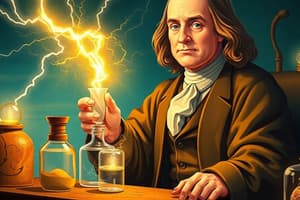Podcast
Questions and Answers
Benjamin Rush was born in ______ in 1745.
Benjamin Rush was born in ______ in 1745.
Philadelphia
Rush studied medicine at ______, interned at Pennsylvania Hospital, and furthered his studies in Edinburgh, Scotland.
Rush studied medicine at ______, interned at Pennsylvania Hospital, and furthered his studies in Edinburgh, Scotland.
Princeton
In 1776, Rush married Julia ______, signed the Declaration of Independence, and became head of the medical department during the Revolution.
In 1776, Rush married Julia ______, signed the Declaration of Independence, and became head of the medical department during the Revolution.
Stockton
During the 1793 yellow fever epidemic in Philadelphia, Rush treated patients with ______ methods and mobilized African Americans for medical assistance.
During the 1793 yellow fever epidemic in Philadelphia, Rush treated patients with ______ methods and mobilized African Americans for medical assistance.
Rush later focused on ______, incorporating Calvinist teachings into his medical practice and publishing the first American textbook on mental illness in 1812.
Rush later focused on ______, incorporating Calvinist teachings into his medical practice and publishing the first American textbook on mental illness in 1812.
Despite his flaws and contradictions, Rush's dedication to bettering ______ and America was a central theme in his life and work until his death in 1813 at the age of 67.
Despite his flaws and contradictions, Rush's dedication to bettering ______ and America was a central theme in his life and work until his death in 1813 at the age of 67.
Which of the following most accurately describes Rush's involvement in the movement for independence?
Which of the following most accurately describes Rush's involvement in the movement for independence?
What controversial beliefs did Rush hold regarding race?
What controversial beliefs did Rush hold regarding race?
How did Rush's medical practices during the 1793 yellow fever epidemic in Philadelphia differ from the norm?
How did Rush's medical practices during the 1793 yellow fever epidemic in Philadelphia differ from the norm?
How did Rush's medical training and education differ from most of his contemporaries?
How did Rush's medical training and education differ from most of his contemporaries?
What was the focus of Rush's later work in the field of psychiatry?
What was the focus of Rush's later work in the field of psychiatry?
What was the central theme in Rush's life and work until his death in 1813?
What was the central theme in Rush's life and work until his death in 1813?
Flashcards are hidden until you start studying
Study Notes
- Benjamin Rush was born in Philadelphia in 1745 and was influenced by his uncle, an evangelical preacher, to become a doctor.
- He studied medicine at Princeton, interned at Pennsylvania Hospital, and furthered his studies in Edinburgh, Scotland.
- Rush became involved in the movement for independence, urging Thomas Paine to publish the influential pamphlet "Common Sense."
- In 1776, Rush married Julia Stockton, signed the Declaration of Independence, and became head of the medical department during the Revolution.
- Rush was active in advocating for medical reforms and abolitionist causes, although he himself owned an enslaved man and held controversial beliefs about race.
- During the 1793 yellow fever epidemic in Philadelphia, Rush treated patients with controversial methods and mobilized African Americans for medical assistance.
- Rush later focused on psychiatry, incorporating Calvinist teachings into his medical practice and publishing the first American textbook on mental illness in 1812.
- Despite his flaws and contradictions, Rush's dedication to bettering Philadelphia and America was a central theme in his life and work until his death in 1813 at the age of 67.
Studying That Suits You
Use AI to generate personalized quizzes and flashcards to suit your learning preferences.




